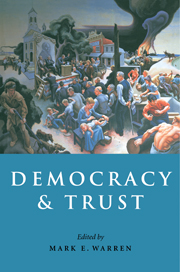Book contents
- Frontmatter
- Contents
- List of figures
- List of tables
- List of contributors
- Acknowledgments
- 1 Introduction
- 2 Do we want trust in government?
- 3 How can we trust our fellow citizens?
- 4 Trust, well-being and democracy
- 5 Democracy and social capital
- 6 Liberty against the democratic state: on the historical and contemporary sources of American distrust
- 7 Trust, voluntary association and workable democracy: the contemporary American discourse of civil society
- 8 Trust and its surrogates: psychological foundations of political process
- 9 Geographies of trust, geographies of hierarchy
- 10 Altruistic trust
- 11 Democratic theory and trust
- 12 Conclusion
- Index
10 - Altruistic trust
Published online by Cambridge University Press: 15 March 2010
- Frontmatter
- Contents
- List of figures
- List of tables
- List of contributors
- Acknowledgments
- 1 Introduction
- 2 Do we want trust in government?
- 3 How can we trust our fellow citizens?
- 4 Trust, well-being and democracy
- 5 Democracy and social capital
- 6 Liberty against the democratic state: on the historical and contemporary sources of American distrust
- 7 Trust, voluntary association and workable democracy: the contemporary American discourse of civil society
- 8 Trust and its surrogates: psychological foundations of political process
- 9 Geographies of trust, geographies of hierarchy
- 10 Altruistic trust
- 11 Democratic theory and trust
- 12 Conclusion
- Index
Summary
A modicum of trust greases the wheels of commerce, politics and social life. Large-scale economies and polities must generate this modicum of trust among strangers. Stranger-to-stranger transactions are most efficient if they can draw on reliable sources of situation-specific and more generalized trust, secured by social and institutional sanctions that punish breaches of that trust and by a moral basis for trustworthiness in individual consciences.
All this is well known. In this chapter I will argue that in addition to trustworthiness, systems of trust work better when members in the system adopt the moral stance of “altruistic trust.” In altruistic trust, one trusts the other more than is warranted by the available evidence, as a gift, for the good of both the other and the community.
Predictive versus altruistic trust
Everyday English suggests at least two meanings for trust. The first is a matter of rational, probabilistic expectation, in regard to either some specific matter (situation-specific trust) or a large set of matters (more generalized trust). Trust in this sense involves prediction. I trust you in this matter up to the point at which my best estimate tells me you are trustworthy, and no more. In this definition, trust itself is not praiseworthy. It is an “unmoralized notion” (Hardin 1993: 512). Because trust is a probabilistic expectation, it is a belief. We do not in general consider beliefs moral or immoral. Therefore trust is neither moral nor immoral. In an interaction in which trust means only prediction, the moral virtue is trustworthiness, not trust.
- Type
- Chapter
- Information
- Democracy and Trust , pp. 290 - 309Publisher: Cambridge University PressPrint publication year: 1999
- 65
- Cited by



